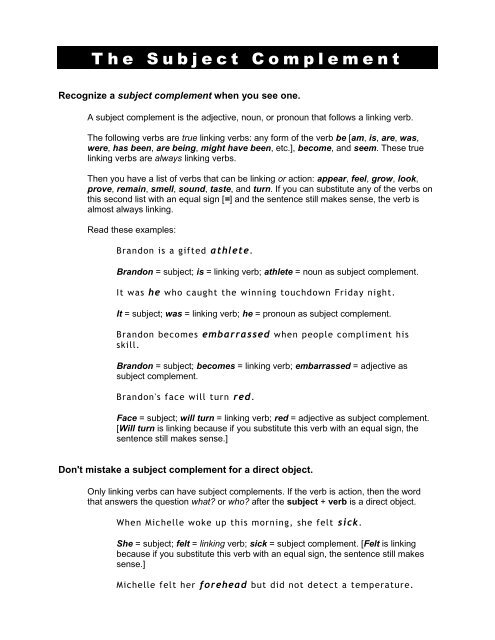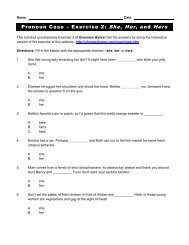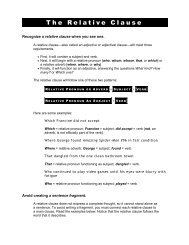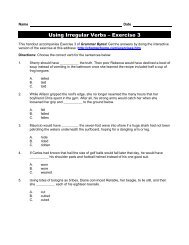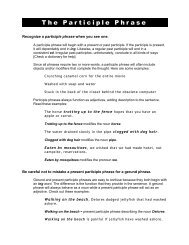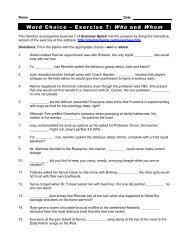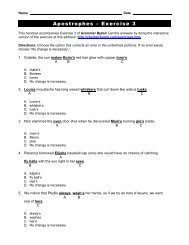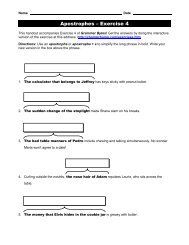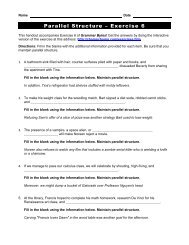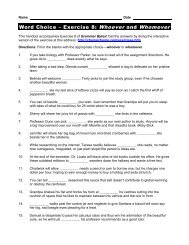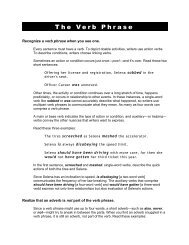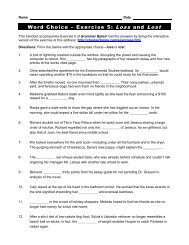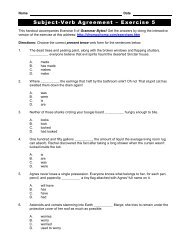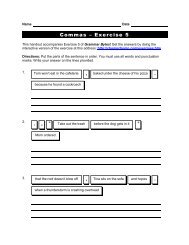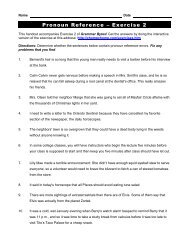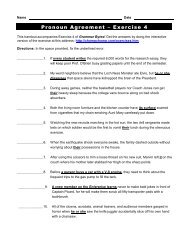The Subject Complement
The Subject Complement
The Subject Complement
You also want an ePaper? Increase the reach of your titles
YUMPU automatically turns print PDFs into web optimized ePapers that Google loves.
T h e S u b j e c t C o m p l e m e n tRecognize a subject complement when you see one.A subject complement is the adjective, noun, or pronoun that follows a linking verb.<strong>The</strong> following verbs are true linking verbs: any form of the verb be [am, is, are, was,were, has been, are being, might have been, etc.], become, and seem. <strong>The</strong>se truelinking verbs are always linking verbs.<strong>The</strong>n you have a list of verbs that can be linking or action: appear, feel, grow, look,prove, remain, smell, sound, taste, and turn. If you can substitute any of the verbs onthis second list with an equal sign [=] and the sentence still makes sense, the verb isalmost always linking.Read these examples:Brandon is a gifted athlete.Brandon = subject; is = linking verb; athlete = noun as subject complement.It was he who caught the winning touchdown Friday night.It = subject; was = linking verb; he = pronoun as subject complement.Brandon becomes embarrassed when people compliment hisskill.Brandon = subject; becomes = linking verb; embarrassed = adjective assubject complement.Brandon's face will turn red.Face = subject; will turn = linking verb; red = adjective as subject complement.[Will turn is linking because if you substitute this verb with an equal sign, thesentence still makes sense.]Don't mistake a subject complement for a direct object.Only linking verbs can have subject complements. If the verb is action, then the wordthat answers the question what? or who? after the subject + verb is a direct object.When Michelle woke up this morning, she felt sick.She = subject; felt = linking verb; sick = subject complement. [Felt is linkingbecause if you substitute this verb with an equal sign, the sentence still makessense.]Michelle felt her forehead but did not detect a temperature.
Michelle = subject; felt = action verb. She felt what? Forehead = direct object.[Felt is action because if you substitute this felt with an equal sign, the sentencedoes not make sense.]Use subject pronouns as subject complements.<strong>The</strong> chart below contains subject and object pronouns. Because a subject complementprovides more information about the subject, use the subject form of the pronoun—evenwhen it sounds strange.S u b j e c t P r o n o u n sIweyouhe, she, ittheywhoO b j e c t P r o n o u n smeusyouhim, her, itthemwhomCheck out these sample sentences:Don't blame Gerard. It was I who woke you from a sound sleep.It = subject; was = linking verb; I = subject complement.Don't get mad at me! I didn't pull your ponytail! It was he.It = subject; was = linking verb; he = subject complement.Remember the amazing guitarist I met? This is she.This = subject; is = linking verb; she = subject complement.©1997 - 2014 by Robin L. SimmonsAll Rights Reserved.


